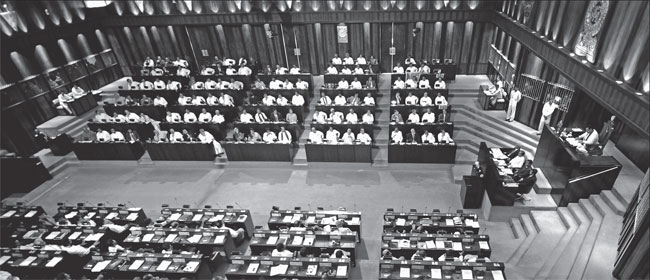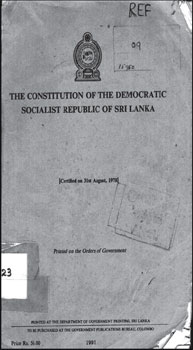Wanted, new Constitution - DEW
Most of country’s problems arose from 1978
Constitution:
Disna Mudalige
Q: There is a discussion at large
over Constitutional change in the country. Do you think Sri Lanka needs
a Constitutional change at this hour?
A: Yes. It is a long felt
need. We have been under three Constitutions. For 25 years we were under
the Soulbury Constitution, for five years under the first Republican
Constitution and for last 35 years, under the Second Republican
Constitution, which is also known as either JR's Constitution or the
1978 Constitution.`
|

Parliament proceedings. File photo |
Within the first 10 years of the enforcement of 1978 Constitution,
there had been 16 amendments to it. In my view, except the 13th and 16th
amendments, all other amendments were for the purpose of strengthening
the Executive Presidency. When looking back at last 35 years, we have
undergone so many crises under the 1978 Constitution, which we did not
experience either under the Soulbury Constitution or First Republican
Constitution.
To mention a few, there had been the ethnic war starting from 1983.
Then there had been confrontations between the Executive, Legislature
and the Judiciary. There had been five impeachments, four against Chief
Justices and one against the President. The sovereignty of the people is
divided today between the President and Parliament. The supremacy of
Parliament has declined. These solely demonstrate the weaknesses in the
1978 Constitution.
Q: If the government is to undertake
the task of Constitutional reforms, do you propose to bring an amendment
to the existing Constitution or enact a new Constitution?
A: A complete new
Constitution is necessary. Not amendments. In my view, most of the
problems that we face today in our country have basically arisen from
the 1978 Constitution.
Therefore, it is absolutely necessary that we must go in for a new
Constitution, taking into account the experiences under the Soulbury
Constitution, first Republican Constitution and 1978 Constitution. In
the meantime, between 1947 and today a lot of changes have taken place
in our country. The economy and society have underdone numerous changes.
So, we will have to bring in the new Constitution to suit the current
needs of the people.
Q: What are the specific weaknesses
identified in the existing Constitution?
A: The 1978 Constitution
is rigid and complicated. It has only benefited the lawyers because you
find every other day a Constitutional case is being taken up in either
the Appeals Court or the Supreme Court. That is our experience in the
last 35 years. We have tried and tested all these three Constitutions
and the ethnic problem remains unsolved.
 If
you revisit what motivated former President J R Jayewardene to bring
this 1978 Constitution, you will find it was mainly because he wanted to
introduce the neo liberalism model of economy into our country. If
you revisit what motivated former President J R Jayewardene to bring
this 1978 Constitution, you will find it was mainly because he wanted to
introduce the neo liberalism model of economy into our country.
That was the purpose for which this Constitutional structure was
brought in. The intention was to accelerate the Capitalist development
as fast as possible.
Then he expected the party he led, the UNP would eternally be in
power through the 1978 Constitution. When he lost the Kelaniya seat in
1956, he shifted to Colombo South, a safer place where he could win,
because that electorate was dominated by the elite of capitalist class.
Then he thought of bringing in new electoral reform. Along with the
Constitution, he brought in new electoral systems. Those are the
proportional representation system and the preferential vote system
which completely distorted the whole electoral system.
That electoral reform gave rise to new problems. Only the rich could
contest and win seats when the district was made the main electorate
instead of a smaller electorate. This marginalized others, such as,
trade union leaders, peasant leaders, school teachers, middle class
people etc. He ensured the return of rich people to Parliament by this
course of action.
That completely distorted the representative character of the
Legislature. Therefore, the role of Parliamentarians has now changed
too. Parliament is expected to be the Legislature. But most of the
Members of Parliament are now doing everything on earth, except engaging
themselves in legislation. The Supremacy of Parliament has changed too.
Q: What are the basic principles on
which the new Constitution should be drafted?
A: In my view, the
Executive Presidency should be abolished in the new Constitution. We
must give the entire power back to Parliament. The Sovereignty of people
should not be divided among the elected President and Parliament. Only
Parliament should clearly represent the sovereignty of the people.
We must go in for a mixed electoral system while retaining the good
features of the proportional representation system. A mixed electoral
system would allow any person, even a middle class man or a leader of
any organization to be elected to Parliament and on the other hand, the
religious and ethnic minorities to be represented in Parliament.
The mix system is supposed to be the best so far. It has been
recognized all over the world. We must do away with the preferential
vote system which is the breeding ground for all kinds of corruption,
violence and bad governance and many other problems that we are facing.
Then in the new Constitution, we must ensure the independence of the
Judiciary. That is absolutely necessary for the good governance and
maintenance of the rule of law. The new Constitution should not allow
any confrontation between the Executive, Legislature and Judiciary.
|

Senior Minister and Communist Party General Secretary D E W
Gunasekara |
There should be a clear demarcation of the powers of these three
organs. The sovereignty of people should really lie with the people and
exercised through the Constitution and the three organs of the State.
We must ensure the unity of people while promoting the Sri Lankan
nation. There should be no second class citizens in the country. All,
including Sinhalese, Tamils, Muslims and others should enjoy equal
rights.
The entire public service has been politicized at the moment and is
faces a crisis. This is another area the new Constitution would have to
look into. At the same time, the new constitution should limit the
number of ministers in the Cabinet. The difference between the Head of
State and the Head of Government should be maintained.
The Head of State should be the Commander of Chief of all Forces. We
should go back to the model of first Republican Constitution or Soulbury
Constitution.
If we do not do these changes, we will be confronted with many other
problems in the future in all spheres of society.
Q: How do you think the government
should proceed on the task of framing a new constitution? Do you think a
Parliamentary Select Committee (PSC) would do for this purpose?
A: Either, a PSC should
draft the new Constitution or we must have a separate Constitutional
Assembly. A Constitutional Assembly is a wider committee formed from the
Members of Parliament.
We should make sure that all shades of opinion are represented in
this task. All parties in the opposition and in government should get
together and try to bring out a new Constitution taking all
post-independent factors and experiences into account. Otherwise, there
is no future for the country. A lot of rethinking is necessary. In my
view, patchwork, such as, the 19th Amendment or the 20th Amendment would
not solve the problems.
Q: What do you think should be
included in the Constitution to prevent ethnic fissures in the country?
A: One single party cannot
solve this problem. It should be a collective effort. All parties should
get together and find a solution to the national question.
It has been proved by history since independence that neither the
government nor a single party can solve this problem.
Q: How is the progress of the COPE
report for the year 2012?
A: There are 235
institutions assigned to the COPE. By now we have completed examination
of accounts in respect of 188 institutions.
The remaining 47 will be completed by March 8. After that, I will be
tabling the report in Parliament. I have already submitted an interim
report.
The full report will be submitted by March end or the beginning of
April.
This is the first time that the committee will be completing all the
institutions assigned to it. |







